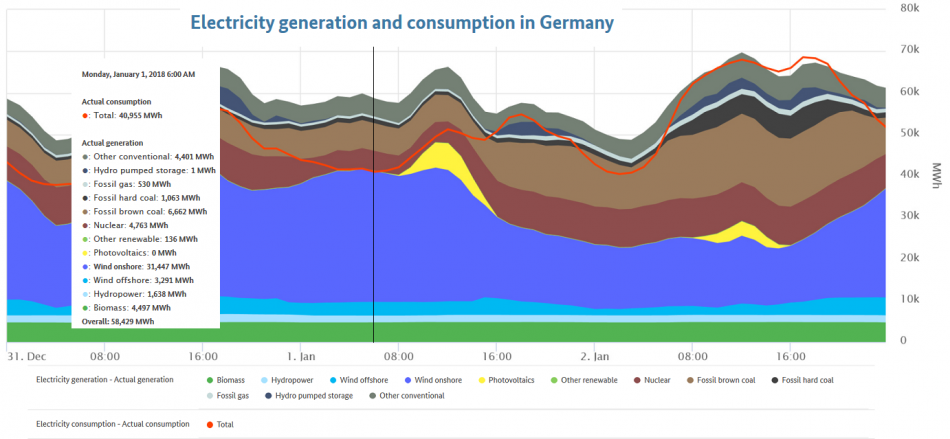Renewables cover about 100% of German power use for first time ever
At around 6:00 am on 1 January, a combination of strong winds and low demand after New Year's Eve celebrations meant that wind power alone produced about 85 percent of Germany’s power consumption, according to data provided by the Federal Network Agency. Hydropower and biomass installations covered the rest, as there was no solar power generation before sunrise.
Coal, gas and nuclear power generation was cut to a minimum as power prices turned negative and surplus energy was exported to neighbouring countries.
“Nobody expected we would reach 100 percent in the early morning of a winter day,” energy state secretary Rainer Baake told the Süddeutsche Zeitung.
Most experts believed it was most likely Germany would cross the threshold on a sunny and windy spring day. Renewables set last year’s record of almost 90 percent of total power use on 30 April 2017.
“This means we are entering a new phase,” said Felix Matthes, research coordinator at the Institute for Applied Ecology. “Renewables have finally left their niche.”
But the data is preliminary and other estimates suggest renewables’ share was 95 percent rather than 100 percent (For details on the difficulty of proclaiming renewable records, read the CLEW factsheet Germany’s renewable generation peaks remain shrouded in data fog.)
Germany makes no progress on emissions reductions
A large increase of wind power generation has pushed Germany’s renewable share of total power use to a record 36.1 percent in the whole of last year, an increase of 3.8 percentage points over 2016, according to energy think tank Agora Energiewende*. A rising number of turbines and a lot of wind meant that wind power outstripped hard coal and nuclear for the first time.
But the country’s total emissions stagnated for the third year in a row, because more oil and gas were used in transport, heating and industry, according to Agora’s review of 2017 developments.
Germany has made climate protection one of its priorities in its Energiewende, a dual shift from fossil fuel and nuclear power to a renewables-based energy system. Germany’s environment ministry warned in October high emissions from coal-fired power plants and transport will make the country miss its 2020 climate targets by a wider margin than previously anticipated.
According to ministry calculations, Germany's CO2 emissions will only be around 32 percent below 1990 levels in three years' time, in contrast to the official target of cutting emissions by 40 percent. The ministry said at the time that a failure of this magnitude would amount to “a disaster for Germany’s international reputation as a climate leader.”
Germany’s only option to drastically cut emissions in the short term is to close down its dirtiest lignite-fired power plants, according to experts.
But the country’s next steps to advance climate policy hang in the balance as Chancellor Angela Merkel’s conservatives struggle to form a new government following September’s general elections. The next government will face numerous challenges to make progress on Germany’s Energiewende and climate protection, including the fate of coal.
The future role of coal-fired power production is likely to figure prominently in potential coalition talks between the Social Democrats and the conservatives. Also, the coal exit commission proposed in Germany’s Climate Action Plan 2050 might start its work in 2018.
Every German government since 2007 has committed to reducing the country’s annual greenhouse gas emissions by 40 percent by 2020 compared to 1990 levels. In 2016, emissions were 28 percent lower than 1990.
What's next for renewables in Germany?
Given the rapid growth of renewable energies, Germany has already reached its target of increasing their share of power consumption to 35 percent by 2020. Green energy proponents call for speeding up the roll-out in the name of climate protection, while large companies warn this would push up electricity costs and undermine industry's international competitiveness.
Germany’s main instrument to support renewables expansion – the renewable energy surcharge – is under intense discussion and the next government will face pressure to reform the system.
Demands for a fairer distribution of costs, and the prospect of rising power demand as heating and transport will have to switch from fossil fuels to electricity to reduce emissions, have led to calls for a new approach to support investment in the sector.
The country has recently shifted to auctions for large renewable installations, to increase the sector's exposure to market forces. This has already led to a sharp decline in costs: Last year, operators offered to build offshore wind farms in the North Sea without relying on support payments in Germany’s first competitive auction for the technology.
*Like the Clean Energy Wire, Agora Energiewende is a project funded by Stiftung Mercator and the European Climate Foundation.


